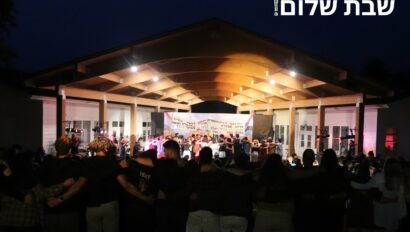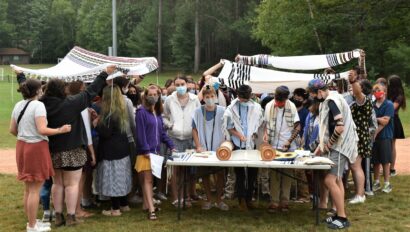Act now for your child to join two hundred other campers who have reserved their place in camp for next summer and will be wearing their special order Ramah in Wisconsin basketball jersey next summer on the Kikar! Register on-line here by August 15 to receive your jersey and to avoid paying credit card fees on any tuition paid (minimum $600 deposit).
Forty-eight hours after bidding farewell to six hundred people, we welcomed an additional two hundred eighty representing fifty-nine families for our 10th annual Family Camp. I am spending this long weekend with delegations from five of our partner synagogues as well as a smattering of other families looking for community, meaning, and the amazing programming and staff Ramah in Wisconsin has to offer. Some of these families represent multiple generations of Ramahniks and others are recent or new additions to our ever-growing family.
The subtext of many of my conversations over the last few days has been: what makes this place so special? Why should my family join this community? How do you do it?
I leave you with some answers from Nivonim 2018. The excerpts below come from divrei Torah (sermonettes) these talented campers gave over the course of their final weekend.
Lila Steinbach, from suburban Chicago, spoke at mishmar last Thursday night, an anticipatory celebration and welcoming of Shabbat. She reflected on one of the songs we sing at mishmar, an excerpt from a traditional meditation said after lighting Shabbat candles on Friday evening.
The words that we utter during mishmar carry significant meaning at camp and in Judaism as a whole. In my opinion, among the most significant are the words of Vezakeini Legadel. While I do love that the song has the word “Nivonim” in it, it’s profound meaning for me is because the words represent an ideal Jewish future, similar to mishmar as a whole. The words translate in English to: “May I have the privilege to raise children and grandchildren, wise and understanding, who love Adonai, revere God, and speak the truth. May they be holy offspring, who cleave to God, and light up the world with Torah and good deeds, and with the work of serving the Creator.” Even in the first few words of the song, the language indicates that we should strive to raise generations and generations of pious, generous, and wise children, as it states banim uvnei banim, “children and grandchildren,” instead of merely banim, “children.” Vezakeini Legadel is a clear summary of a family’s objectives when they send their children to Ramah. Vezakeini Legadel’s supplication is for us, as Jews, to raise generations of children who are wise, understanding, God-fearing, honest, and serving the world and God. Ramah’s combination of community service, prayer, Jewish education, and enthusiasm about every activity sets us up to become the generations described in Vezakeini Legadel.
Tamir Grey, from Cincinnati, spoke on Shabbat morning about key themes from the parashah (Torah reading), specifically the enduring quality of the b’rit (covenant) between God and b’nei yisrael (the Israelites) during the forty years of wandering in the desert.
For b’nei yisrael, their journey was a quite literal wandering through the desert. For our aidah (division), that journey has been our whole camp experience. Camp has guided me and I’m sure many of you through life and Judaism. Although we are coming to the end of our journey as campers, I encourage all of you to view this as the beginning of another stage. Just like b’nei yisrael was about to encounter something completely different from their years in the desert with God, we are moving into an Eretz Canaan (Land of Canaan) of our own. Our Eretz Canaan is the continuation of our Jewish lives in a role that’s not as a camper at Ramah. We must use the experiences from our journey to shape our Jewish lives. If we forget all that camp has done for us, if we cease to be grateful, our Jewish lives and life as a whole would be bleaker.
We have to continue our b’rit with camp. We’ve already done half of it: we’ve already been intentional about our actions by getting into z’mirot (Shabbat songs), pe’ulot (activities), and much more. Now, we have to move on from camp, through the barrier, into the rest of our Jewish lives with gratitude. We have to be grateful by sharing our memories with other people. Like Moses said about befriending the stranger because the Israelites were once strangers, we have to bring outsiders into our community to create a new community.
Many people get upset about the end of camp but I suggest looking towards b’nei yisrael as an example: they were leaving everything they had known up until that point in order to go into a new land. In that land, not only were they completely unaware of what would happen but their God, their guiding force for the previous forty years, would no longer be a direct guide to them. You have every right to be scared but keep in mind that this change is not all bad; camp will still be impacting us throughout our Jewish lives. B’nei yisrael was tested greatly through their journey. We have been tested time and again and now we are about to be faced with the biggest test yet: moving on from camp but bringing camp with us. Our journey is just beginning. B’hatzlachah (good luck).
Dina Barrish, from suburban Chicago, spoke on Friday night about the nature of community as reflected through the Torah reading and the Disney Pixar movie Inside Out, specifically its focus on five core emotions experienced by its main character, Riley.
We know the feeling of belonging– to have a place where we feel completely content in our own skin. Such comfort among a group of individuals is special, sacred. Riley has her core emotions, but lacks a group with which to empathize and expose raw feeling. B’nei Yisrael has the group aspect, but rather than allowing their emotions to positively influence their behavior, they neglect the power of emotion and sin before God. Neither Riley nor B’nei Yisrael perceives the co-dependence of emotion and action, causing her to fail to grasp the concept of change, of leaving a permanent legacy on the outside world. Unlike our aidah, neither Riley nor B’nei Yisrael manifest the determination to enact change defined in our summer long theme, hitor’ri hitor’ri (Awake! Awake!).
Contrary to Riley and B’nai Yisrael, Moses proves innately aware of the significance of legacy. Despite his Egyptian upbringing, Moses empathizes with the Israelite perspective and murders an abusive Egyptian slaveholder. S’forno (Italian medieval Rabbi) comments on Moses’ impulsive decision to save the Israelite, asserting that Moses was aroused to avenge the affliction of the Israelite because of his feeling of brotherliness to the victim. Just as the magic of our aidah’s unique personalities and responses to emotion forms the ideal collective identity, so too does the magic of Moses’ inherent cognizance of his obligation as a Jewish leader inspire change in the Jewish community. Moses woke up – hitor’ri hitor’ri – and realized where he belonged, what he should be striving to achieve in the world. Moses acted upon leadership instincts that enacted change in the world around him.
Nivo 2018, we should be like Moses. Our communal knowledge surpasses the fundamental oversights of Riley and B’nei Yisrael; our united strength matches arguably the most prominent Jewish leader. As we leave camp, our legacy as an aidah is the emergence of 51 catalysts for change.
We know joy, anger, fear, disgust, and sadness. We know that, unlike Riley, we have one another to rely on. We know that our vulnerability influences our behavior. We know that this behavior molds our personality—unique individual personalities that comprise a cohesive unit. We know that the identity of this cohesive unit proves one that has woken up to our obligation to leave an internal and external legacy. We know what we have to do, Nivonim. It’s time: Time to answer Joy’s question of what is going on inside our heads. Time to confidently claim that our minds, crowded with core emotions and memories and ideas and thoughts, are ready to impact the world with our personalities. Let’s go make a difference.
Wishing you all a Shabbat Shalom,
Jacob






